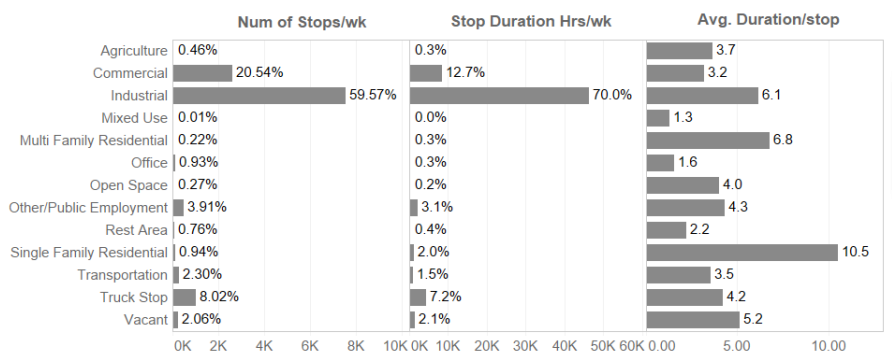The Biden administration has issued a new handbook to give state and local planning groups and private industry detailed procedures for assessing demand for truck parking and boosting parking capacity.
The 80-page publication, “Truck Parking Development Handbook,” was developed from information provided to and generated by the National Coalition of Truck Parking, a group of public and private sector officials coordinated by the Federal Highway Safety Administration.
The handbook “outlines the fundamentals of truck parking issues, factors that influence truck parking demand and options for integrating truck parking at locations where it is most needed,” said FHWA Acting Administrator Stephanie Pollack at a meeting of the coalition on Friday.
The handbook outlines strategies and case studies for developing truck parking that:
— Support safe freight transportation corridors.
— Integrate parking needs with truck demand.
— Ensure compatibility with adjacent land uses through siting and design.

Source: FHWA Truck Parking handbook/Maricopa Association of Governments, 2021.
The publication also provides information on how to conduct benefit-cost analysis and economic impact analysis of truck parking projects following U.S. Department of Transportation guidelines.
“One of the hurdles that often prevent agencies from developing or expanding truck parking capacity is the associated capital and operational costs,” the handbook states. “The cost and availability of land in urbanized areas may limit the development of privately- or publicly-owned truck parking.
“However, understanding the monetary value of parking and knowing how to quantify the safety, travel time savings, and infrastructure preservation benefits, along with the costs and to whom they accrue, may facilitate the development of safe truck parking through developments led by the public sector, the private sector, or through public-private partnerships.”
Commenting on the coalition’s meeting, Federal Motor Carrier Safety Administrator Robin Hutcheson noted that driver fatigue was a leading cause of truck crashes. “It is clear that adequate rest for drivers is foundational for safe operations,” Hutcheson said. “We have heard loud and clear from drivers — they need more places to rest and they need to be safe and secure while doing so.”
DOT also recently updated their guidance on federal funding sources eligible to states looking to boost truck parking capacity, including the $47.4 billion available in eight programs.












Ken webb
The “not my problem and not in my back yard” crowd needs to get over themselves. Every single item, we all touch, got there via a truck.
We need multiple targeted plans for big cities and rural routes. There is no single answer. It will be expensive.
Personally, i favor the non governmental tax dollar approach. They will manage to mismanage billions down the drain. No thanks.
Better is to simply bill customers. They wont like it, consumers wont like it… but too bad. They dont like anything anyways, its all a drain on their bottom lines. But… they can either pay me to do it or they can haul their own cheao chinese junk and pass that cost onto customers.
I know, its a crazy solution! Trust me though, it will work. Nobody has to sit for free or oark on off ramps, they the drivers simply choose to work under those conditions. Just as some companies choose to have a 94% turnover rate. When they cant keep cheap labor behind the wheels there is suddenly a labor shortage? Haha! No that is the other side of market forces.
Allow market forces to actually bankruot the cheap labor philosophy. Write tickets to the owners of the companies for illegally parked trucks and it will stop. I promise you they will find a solution if forced.
Kyle J McKee
it’s simply amazing that not ONE individual on this consortium has a CDL License or for that matter has never ever driven a CMV. Yet, these same individuals with there “Ivy League” college degrees are the very ones who are proposing legislation for truck parking. The Secretary of the DOT has no CDL, never drove a truck, never maneuverd a 53ft trailer through traffic, never operated a ELD. simply amazed that we as a country keep putting the wrong people in position where they have no business being in.
Stephen Webster
we should have provide 3 overnight parking spot for each dock door with 40% with a 20 Amp plug and bathrooms.
Robert Thomas Cooper
This is a good start but that is all it is, a good start. People looking into these projects need to realize that simply doing things like placing signs showing how many parking spots are open 20 miles down the road are not really useful. Especially when the signs don’t work or aren’t turned on. The cold, hard truth is that there needs to be more well maintained asphalt out there for the trucks to park on. It needs to be easily accessed, well lit and maintained. By maintained, I mean that it needs to have plenty of trash cans that are emptied regularly, clean bathrooms and good lighting in addition to keeping the road surfaces repaired and in good shape. This costs money but we have to have some place to park. It also means that these facilities can’t be turned into private parking for drivers to use when they’re home and leave those of us working without any spaces to park. If you’re looking for that, find a spot to build a pay-to-park facility where you get an assigned spot.
Regardless of anything else, this whole trend of states cutting their budgets by closing rest areas and leaving trucks in a lurch to find a place to park has to stop. (I’m looking at you Indiana, Iowa and Oklahoma!!!) With freight volumes projected to continue to grow in the long term, this is an issue that we need to get ahead of now before it is too late.